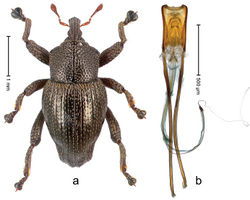Trigonopterus arjunensis
| Notice: | This page is derived from the original publication listed below, whose author(s) should always be credited. Further contributors may edit and improve the content of this page and, consequently, need to be credited as well (see page history). Any assessment of factual correctness requires a careful review of the original article as well as of subsequent contributions.
If you are uncertain whether your planned contribution is correct or not, we suggest that you use the associated discussion page instead of editing the page directly. This page should be cited as follows (rationale):
Citation formats to copy and paste
BibTeX: @article{Riedel2014ZooKeys, RIS/ Endnote: TY - JOUR Wikipedia/ Citizendium: <ref name="Riedel2014ZooKeys">{{Citation See also the citation download page at the journal. |
Ordo: Coleoptera
Familia: Curculionidae
Genus: Trigonopterus
Name
Trigonopterus arjunensis Riedel sp. n. – Wikispecies link – ZooBank link – Pensoft Profile
Diagnostic description
Holotype, male (Fig. 9a). Length 3.20 mm. Color of legs and antennae ferruginous except tarsi black; remainder black. Body elongate; in dorsal aspect with marked constriction between pronotum and elytron; in profile dorsally flat, apically convex. Rostrum with median and pair of submedian ridges; intervening furrows each with sparse row of erect piliform scales; epistome simple. Pronotum with sides diverging apicad, anteriorly subangularly projecting; with indistinct subapical constriction; disk coarsely punctate; interspaces microgranulate; each puncture containing recumbent piliform scale directed laterad; with median ridge. Elytra with striae indistinct, marked by fine lines and rows of small punctures; intervals flat, microreticulate, with rows of small punctures; with sparse, recumbent, piliform scales, more conspicuous bordering basal margin; interval 7 in apical third forming sharp lateral edge; sutural interval at apex weakly swollen; apex subangulate, at suture with shallow notch. Femora edentate; anteroventral ridge crenulate. Metafemur subapically with stridulatory patch. Dorsal edge of tibiae subbasally angulate, mesotibia with angulation extended as acute tooth. Tarsomere 3 of protarsus slightly larger than of mesotarsus. Abdominal ventrite 5 flat, apically coarsely punctate, sparsely setose. Penis (Fig. 9b) with sides of body weakly diverging; apex medially pointed; transfer apparatus flagelliform, 4.0 × longer than body; apodemes 3.1 × as long as body; ductus ejaculatorius without bulbus. Intraspecific variation. Length 3.09–3.34 mm. Females more slender than males. Integument of males rather dull; females with punctures sparser and smaller, interspaces polished. Recumbent piliform scales in some specimens very small and sparse, almost absent in females. Female rostrum with median and pair of submedian glabrous costae.
Material examined
Holotype (MZB): ARC2474 (EMBL # LM655811), East Java Prov., Mt. Arjuno, road Batu - Pacet, Cangar, sample 5, S07°43.400', E112°31.768', 1419 m, 15-XI-2011. Paratypes (MZB, SMNK, ZSM): E-Java Prov.: 4 exx, ARC2473 (EMBL # LM655810), ARC2475 (EMBL # LM655812), same data as holotype; 1 ex, ARC2476 (EMBL # LM655813), Mt. Arjuno, road Batu - Pacet, Cangar, sample 4, S07°43.247', E112°31.641', 1388 m, 15-XI-2011; 4 exx, ARC2477 (EMBL # LM655814), ARC2478 (EMBL # LM655815), ARC2479 (EMBL # LM655816), Kediri, Mt. Wilis, Besuki, sample 1, S07°51.785', E111°50.188', 1379 m, 21-XI-2011; 4 exx, Kediri, Besuki, Mt. Wilis, sample 6, S07°51.709', E111°50.100', 1409 m, 22-XI-2011; 9 exx, ARC2485 (EMBL # LM655822), ARC2486 (EMBL # LM655823), ARC2487 (EMBL # LM655824), ARC2488 (EMBL # LM655825), Kediri, Mt. Wilis, Besuki, sample 7, S07°51.638', E111°50.010', 1432 m, 22-XI-2011.
Distribution
E-Java Prov. (Mt. Arjuno, Mt. Wilis). Elevation: 1388–1432 m.
Etymology
This epithet is based on the type locality Mt. Arjuno.
Notes
Trigonopterus arjunensis Riedel, sp. n. was coded as “Trigonopterus sp. 356”.
Original Description
- Riedel, A; Tänzler, R; Balke, M; Rahmadi, C; Suhardjono, Y; 2014: Ninety-eight new species of Trigonopterus weevils from Sundaland and the Lesser Sunda Islands ZooKeys, (467): 1-162. doi
Images
|
